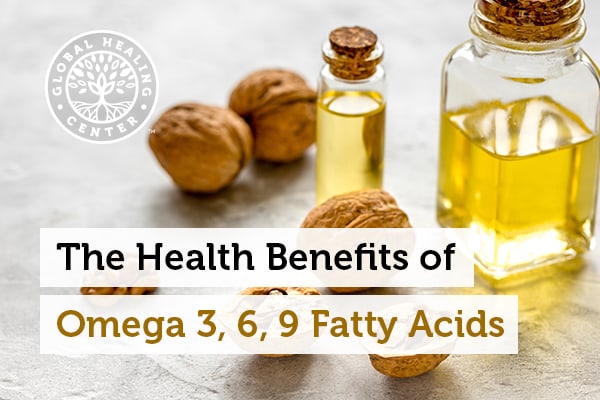
You've probably heard the terms "fatty acid" and "omega 3" before, but do you know what a fatty acid is or why your body needs it? What about the different types of fatty acids, what foods you can naturally find them in and how much your body needs to live a long, healthy life?
Fatty acids are important for all systems of the body to function normally, including your skin, respiratory system, circulatory system, brain and organs. There are two fatty acids, termed essential fatty acids (EFA) that your body does not produce on its own. EFAs have to be ingested.
The two essential fatty acids that the human body cannot produce are the omega-3 fatty acid and omega-6 fatty acid, which are important for brain development, immune system function and blood pressure regulation.
What is Omega-3 Fatty Acid?
Omega-3 fatty acid (Alpha-linolenic acid) is an essential fatty acid that plays an important role in brain function and may help you fight against cardiovascular disease [1]. The American Heart Association recommends a diet in which fatty fish, like salmon, herring, sardines and tuna are consumed at least twice a week.
While these foods are high in omega-3 fatty acid, I personally do not agree with this recommendation as fish can be contaminated and may be high in mercury, which can have detrimental health effects. Plus, I believe a raw food diet consisting of little to no meat is better for the human body.
Health Benefits of Omega-3 Fatty Acid
Research on the health benefits of omega-3 fatty acid have shown that it may be useful for supporting the following:
Omega-3 fatty acids are found naturally in:
- Grains
- Spirulina
- Brazil Nuts
- Hempseed Oil
- Mustard Seeds
- Pumpkin Seeds
- Chia Seed Oil
- Wheat Germ Oil
- Canola Oil (Rapeseed)
- Green Leafy Vegetables
- Raw Walnuts & Walnut Oil
- Flaxseeds or Flaxseed Oil
What is Omega-6 Fatty Acid?
Omega-6 fatty acid (Linoleic Acid) combined with omega-3 fatty acid produces many of the health benefits described above, but the trickiest part about playing the fatty acid game is that it is best to eat them in the right amounts.
You should be eating about twice as much omega-6 as omega-3, so that your omega-6 to omega-3 ratio is 2:1, but in today's world of fast food, frozen entrees, and high calorie snacks, it is not uncommon for most people to actually be getting about 15 times more omega-6 than omega-3. Washington DC's center for Genetics, Nutrition and Health suggest that eating omega-6 and omega-3 in the wrong proportions may actually negate the health benefits.
The best sources of omega-6 are seeds, nuts and grains and green leafy vegetables, like lettuce, broccoli, purslane and kale, and in certain raw vegetable oils. Care should be taken to use raw cold pressed vegetable oils because cooking destroys the benefits of the fatty acids.
Omega-6 fatty acids are also found naturally in:
- Olive Oil
- Wheatgerm
- Grapeseeds
- Pistachios
- Sesame Oil
- Hempseed Oil
- Pumpkin Seeds
- Chia Seed Oil
- Safflower Oil
- Sunflower Oil
- Cottonseed Oil
- Raw Nuts & Seeds
What is Omega-9 Fatty Acid?
Omega-9, or monounsaturated oleic and stearic acid, is a non essential fatty acid produced naturally by the body whenever there is enough of either Omega 3 and 6 essential fatty acids.
However, if you do not have enough omega 3 and omega 6, then you must get omega 9 from your diet.
This fatty acid plays a role in promoting heart health by supporting healthy, balanced cholesterol levels and improving immune function.
Omega-9 fatty acids are also found naturally in:
- Almonds
- Hazelnuts
- Pistachios
- Macadamia Nuts
- Chia Seed Oil
- Olives & Olive Oil
What is EPA and DHA?
Within the body omega-3 fatty acids are converted to DHA and EPA (docosahexaenoic acid and eicosapentaenoic acid, respectively). DHA and EPA are highly unsaturated fats that play very important roles in the vision development and brain function of infants.
One study found significantly lower amounts of EPA in the cells of patients who had attempted suicide, suggesting that omega-3 fatty acids may actually play a role in suicide prevention. A lack of DHA has been associated with Alzheimer disease, attention disorders, phenylketonuria, cystic fibrosis and other diseases. Blue green algae is a good source of EPA and DHA.
References (11)
- Wang C, Harris WS, Chung M, Lichtenstein AH, Balk EM, Kupelnick B, Jordan HS, Lau J. n-3 Fatty acids from fish or fish-oil supplements, but not alpha-linolenic acid, benefit cardiovascular disease outcomes in primary- and secondary-prevention studies: a systematic review. Am J Clin Nutr. 2006 Jul;84(1):5-17. Review.
- Agency for Healthcare Research and Quality. Health Effects of Omega-3 Fatty Acids on Asthma. 2004 March. Publication No. 04-E013-1
- Mita T, Watada H, Ogihara T, Nomiyama T, Ogawa O, Kinoshita J, Shimizu T, Hirose T, Tanaka Y, Kawamori R. Eicosapentaenoic acid reduces the progression of carotid intima-media thickness in patients with type 2 diabetes. Atherosclerosis. 2007 Mar;191(1):162-7. Epub 2006 Apr 17.
- Fortin PR, Lew RA, Liang MH, Wright EA, Beckett LA, Chalmers TC, Sperling RI. Validation of a meta-analysis: the effects of fish oil in rheumatoid arthritis. J Clin Epidemiol. 1995 Nov;48(11):1379-90.
- Vanek C, Connor WE. Do n-3 fatty acids prevent osteoporosis? Am J Clin Nutr. 2007 Mar;85(3):647-8.
- Augustsson K, Michaud DS, Rimm EB, Leitzmann MF, Stampfer MJ, Willett WC, Giovannucci E. A prospective study of intake of fish and marine fatty acids and prostate cancer. Cancer Epidemiol Biomarkers Prev. 2003 Jan;12(1):64-7.
- University of Maryland Medical Center. Omega-3 fatty acids overview. The University of Maryland Medical System.
- McKenney JM, Sica D. Prescription omega-3 fatty acids for the treatment of hypertriglyceridemia. Am J Health Syst Pharm. 2007 Mar 15;64(6):595-605. Review.
- National Center for Biotechnology Information. Does fish oil lower blood pressure? A meta-analysis of controlled trials. http://www.ncbi.nlm.nih.gov/pubmed/8339414
- Richardson AJ, Montgomery P. The Oxford-Durham study: a randomized, controlled trial of dietary supplementation with fatty acids in children with developmental coordination disorder. Pediatrics. 2005 May;115(5):1360-6.
- Su KP, Huang SY, Chiu CC, Shen WW. Omega-3 fatty acids in major depressive disorder. A preliminary double-blind, placebo-controlled trial. Eur Neuropsychopharmacol. 2003 Aug;13(4):267-71. Erratum in: Eur Neuropsychopharmacol. 2004 Mar;14(2):173.
†Results may vary. Information and statements made are for education purposes and are not intended to replace the advice of your doctor. If you have a severe medical condition or health concern, see your physician.







